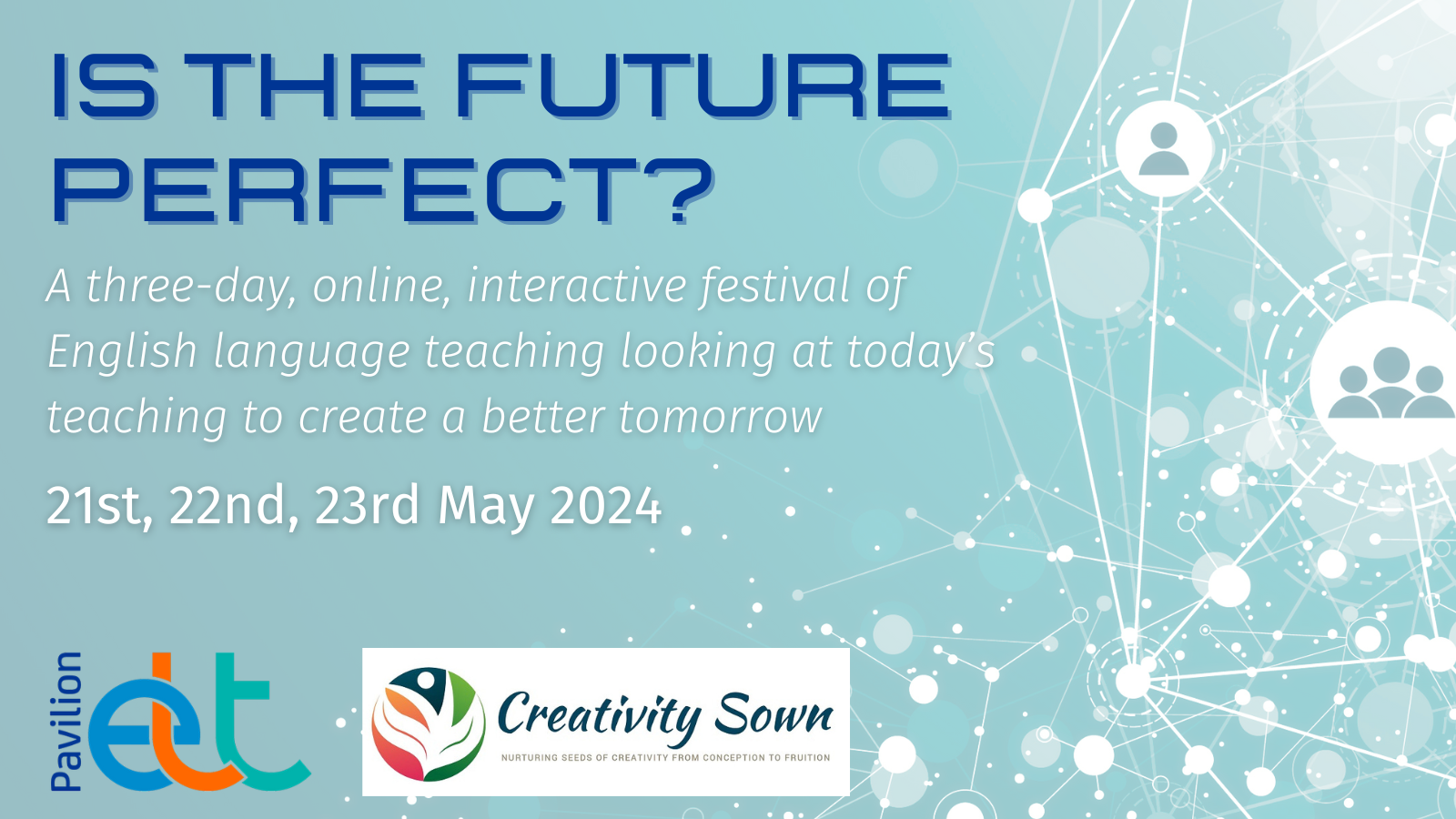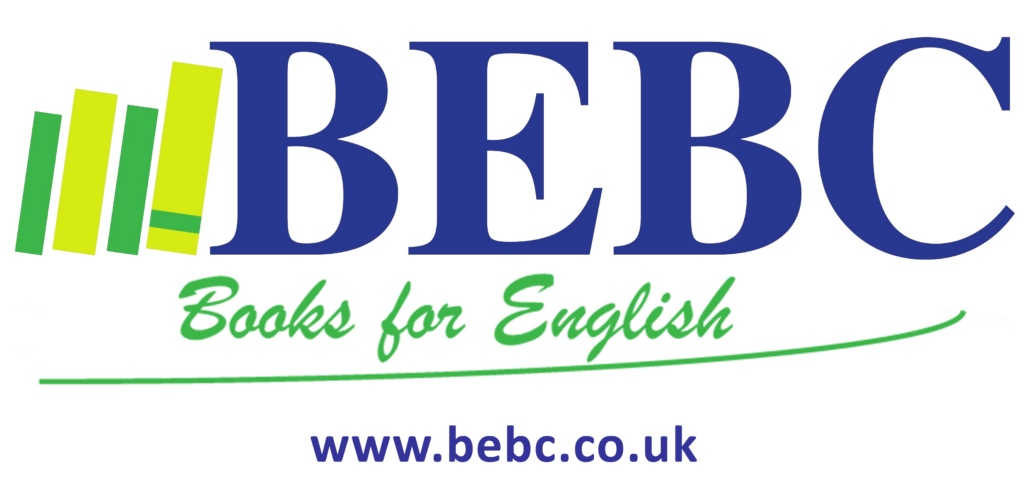Is the Future Perfect? 2024
A three-day, online, interactive festival of English language teaching looking at today’s teaching to create a better tomorrow

Day 1: Shifts in teaching – who are we teaching to and how?
Day 2: Shifts in language – what are we teaching and how?
Day 3: Shifts in techniques– how are we teaching and why?
You can view the full programme so far below!
Dates: 21st, 22nd and 23rd May 2024
Times: 13.00 – 17.00 BST each day
Host: Kirsten Holt, Creativity Sown
Price: £10 administration fee.
The administration fee covers access to all live sessions across the three-day online, interactive festival, a CPD certificate of attendance, recordings of the talks, any support material and resources from the talks, and access to exclusive discounts.
If you would like to purchase 5 or more tickets for your organisation, you can save 50%, and get 5 tickets for just £25! Discount will automatically be applied at checkout.
Sponsor: Bournemouth English Book Centre
Description: The world of English language teaching is ever changing. New research, new ideas and new technologies all play a huge role, but have our teaching practices kept pace? How often do teachers give themselves a moment to stop and reflect on these changes, and how they impact their own teaching? And, how easy is it to find, understand and implement some of these changes in their teaching practices?
Our second annual three-day, online festival of English language teaching aims to help. Fantastic speakers will present on a wide range of different topics, as we explore some of the key changes and current themes in English language teaching. The first day will consider the types of people we are teaching, whilst the second day moves on to explore what we are teaching. Finally, Day 3 will round off the festival by examining the shifts in how we are teaching.
By the end of the festival, we will have celebrated the successes of change and creativity in global language teaching, teaching methods and techniques, understood more about who we are teaching and where ELT is headed and discussed what we need to do to be effective teachers of tomorrow.
Whilst we hope you will be able to join us across all three days of the festival, we also know that the dates and times might not work well for everyone. However, we are delighted that all the sessions will be recorded, and will be made available for everyone who has signed up! This means that you can watch all the sessions back later in your own time, all as part of the administration fee.
The programme so far…
Please note, the programme, speakers and talks may be subject to change at any time.
Day 1: Shifts in teaching – who are we teaching to and how?
13.00-14.00: Future-proofing young children’s language learning through stories – Carol Read
A major challenge for educators is to reconcile adopting a global, whole child approach with attaining specific language learning objectives that can be measured and assessed. The main aim of this interactive session is to explore the current and future role of stories in making learning inclusive and dynamic as well as extending children’s understanding of the real world and fulfilling language syllabus demands. You will leave the webinar with an enriched understanding of storytelling pedagogy in the early years and a toolkit of creative ideas which you can use instantly in your own classes.
14.30-15.30: ELT – Inclusion 2024 – how far have we come? – Varinder Unlu
Equality, diversity and inclusion are words that have become fashionable over the past decade. They are used in almost every presentation, every school has an EDI policy, and staff are asked to attend EDI training. Everyone and every school is inclusive. Or are they? What are we doing to ensure that we are fully inclusive and diverse in our everyday practices? Varinder will be answering these questions and much more, so you will leave feeling inspired and with ideas to implement in your teaching practice or your school.
16.00-17.00: Who’s teaching who? – Kirsten Holt
AI is cool, AI is hot … Or, AI is NOT the tool on its own to transform teaching and learning? With more than 12,000 AI apps, advances in technology have made it possible for people to ‘get by’ in a foreign language without spending any time learning it, with some learners even questioning the point of having lessons, saying ‘AI will do it for me’ (think translation apps and chatbots for both written and spoken language). So, how can we turn the tide? In this session, Kirsten will look at adding value to our lessons to slow down, or avoid, the move to AI apps or chatbots for learning, whilst drawing on our knowledge and experience to see how AI tools and content can enhance our own teaching and professional development as well as our students’ learning. There will be opportunities to reflect on and try out a number of practical ideas.
Day 2: Shifts in language – what are we teaching and how?
13.00-14.00: Redesigning interactive activities for the twenty first century – Jill Hadfield
In this practical interactive session Jill Hadfield will first briefly look at general considerations to be taken into account when updating communicative materials such as games: historical changes, PARSNIP, technology and new language teaching foci. She will look at various challenges involved in designing and updating interactive materials, focusing principally on the challenge of designing online interaction. Using practical activities from the newly updated Communication Games titles (Pavilion Publishing), she will outline a framework that teachers can use to develop online interaction.
14.30-15.30: What’s it mean it’s different, spoken grammar? – Jon Hird
The grammar of spoken English is in a number of ways different from the grammar of written English, which is much of the grammar that learners are generally taught. This practical and interactive session considers some key features of spoken grammar and explores how we can introduce this into our teaching to help our learners better understand and use it.
16.00-17.00: So, how can we get our teaching of teenagers to the next level? – Chris Roland
In this pre-recorded, yet dynamic, session Chris Roland will highlight ways to take your teens teaching forward whilst navigating areas that have traditionally caused difficulty, including teacher mindset, language acquisition, learner behaviour, classroom management, what you can allow your adolescents to do and what you perhaps shouldn’t, and how you can help with pre-exam jitters. In advance of this session, participants will be invited to submit question on trouble shooting the teaching of adolescents.
Day 3: Shifts in techniques – how are we teaching and why?
13.00-14.00: Creating a lesson around a short story – Sharon Ahlquist
A story which engages the learner is a valuable classroom resource for the development of reading and listening, a starting point for speaking and writing, exposure to grammar in context, and a source of vocabulary. This interactive talk will demonstrate how a lesson can be built up around a short story in order to fulfil a number of stated learning objectives. Participants will try out a number of tasks designed to pique interest, support understanding and promote second language development.
14.30-15.30: Teachers as Eco-activists – Alan Maley
In this session, Alan Maley will make the case that teachers have enormous influence on their students and that we have a role to play in reducing the effects of ‘civilization’ on our planetary eco-system. Teachers are powerful role models but to be effective, they need to be well-informed and inspired to action, and to be aware of the resources and sources they can tap to transform their teaching. Alan will suggest ways participants can do this, with reference to a number of existing initiatives. He will also discuss the many obstacles that stand in the way of implementing Eco-action both at social and personal levels. As a take-away, participants will be given an extensive bibliography and lists of resources within a padlet.
16.00-17.00: Addressing inequality in the ELT industry – Carol Lethaby
This interactive talk examines the origins of patriarchal societies and societal expectations, as well as the history of the spread of English around the world. The session reviews an ELT profession that is largely populated by women, but where men disproportionately hold positions of influence. Carol Lethaby will examine the various factors that have contributed to pervasive and lasting gender inequality in ELT and consider what can be done about this, both in the classroom and in the industry as a whole.
Sessions will take place between 13.00-17.00 GMT each day.



